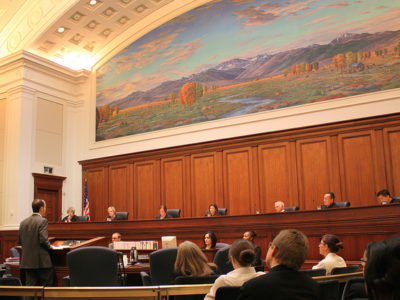“California Alone” Should Not Govern State Climate Policy
SB 775 Turns California Inward and Diminishes Its Role As Global Leader
Last week, Senator Bob Wieckowski (D-Fremont) introduced a new bill, SB 775, that would replace California's cap-and-trade system with a new approach to regulating California's greenhouse gas emissions beginning in 2021. There is much to admire in the new bill, including an aggressive pricing approach that would ensure that California’s carbon price remains high. The bill proposes returning to California residents much of the revenue raised from the carbon price in...
CONTINUE READINGThe Future of California’s Greenhouse Gas Cap and Trade Program After 2020: A Conversation
Posts on Legal Planet Over the Coming Week, Linked Here, Will Address Pending California Legislation on Cap and Trade from Multiple Perspectives
This post is the preface to a series of posts by multiple authors (including guests) over the coming week (starting May 9) about the future of the state's cap and trade program for greenhouse gases. Two bills, AB 378 and SB 775, are being debated by the environmental and environmental justice communities, and our bloggers will discuss their implications as the Legislature takes them up. The initial posts will focus heavily on SB 775, which is scheduled for an informa...
CONTINUE READINGThe California Supreme Court’s Environmental Docket: A Tale of Two Arguments
Justices Seem Likely to Reach Environmentally-Friendly Result in One Case, But Reject Environmentalists' Claims in Other
Last week I posted a preview of three key environmental law cases that were scheduled for argument over two days in the California Supreme Court. I attended the arguments in two of those cases, held in San Francisco last Thursday. Here's an account of what transpired, along with my predictions of the likely outcomes in both cases. Lynch v. California Coastal Commission This regulatory takings claim was brought by Encinitas oceanfront landowners, who sought and ...
CONTINUE READINGPoliticians and Commentators Who Criticize Recent National Monuments Are Making Up Their Own Version of History
Republican Presidents from Teddy Roosevelt to Herbert Hoover Designated Millions of Acres Under the Antiquities Act
As several colleagues and I noted here recently, President Trump recently issued an executive order that will result in "review" of national monuments created since 1996. (The Antiquities Act grants Presidents the authority to reserve federal lands as national monuments, protecting them from much new resource extraction and development that would otherwise potentially be available on those lands.) As we explained, the Antiquities Act doesn't give Presid...
CONTINUE READINGThinking Globally, Acting Transnationally
Despite Trump, Americans are joining the international fight against climate change.
The U.S. government obviously isn't going to be taking a global leadership role regarding climate change, not for the next four years. At one time, that would have been the end of the story: the only way to accomplish anything internationally was through national governments. But we live in a different world today and there are other channels for international action against climate change. Today, transnational networks of state and local governments, private firms...
CONTINUE READINGEnvironmental Budget Update
Trump's brutal attack on environmental spending seems mired in Congress.
It was clear early on that the stop-gap funding measure rejected Trump's budget priorities. Emerging details about the bill demonstrate how starkly Trump lost. Environmental and energy programs survived with very little damage. Let's begin with the EPA budget. Trump sought an immediate cut, followed by a 33% cut in the next budget. Instead, EPA received only a 1% cut, and maintains its current staffing level. Funding was maintained for the $435.8 million, inc...
CONTINUE READINGClimate “Skeptic” Bret Stephens Cherrypicks Bad Climate Policies In The New York Times
Another misleading op-ed from the new columnist
Bret Stephens, the New York Times' new columnist, got the climate change world into an outrage with his first column last week, which compared climate science to Hillary Clinton's pre-election polling and argued for restraint from climate advocates. In his follow up column yesterday, he took a more measured tone, noting that he believes the Earth is warming but that we're not being careful on the solutions: A decade ago we were plowing money into ethanol subsidies as...
CONTINUE READINGPublic Lands Watch: Omnibus Appropriations
No significant new policy riders in the Omnibus Appropriations bill
Late last night, a bipartisan agreement was reached for funding the federal government through the rest of Fiscal Year 2017. These omnibus appropriations bills often are a tool for inserting riders that impose significant restrictions on how agencies manage the public lands. However, this year there are no new significant policy riders inserted in the appropriations bill. We will keep you posted about what happens this fall with the appropriations process. (You c...
CONTINUE READINGIt’s Environmental Law Week at the California Supreme Court
Justices to Hear Oral Arguments in Three Major Environmental Cases This Week
The California Supreme Court currently has approximately twenty pending environmental cases on its docket. This week, the Court's justices will hear oral arguments in three of the most important of those cases. Taken together, these looming decisions raise important issues concerning the California Environmental Quality Act (CEQA), federal preemption, climate change mitigation and adaptation, private property rights and the California Coastal Act. The Court conven...
CONTINUE READINGThinking Globally, Acting Soldierly
Looking for people who care about climate change? Try the Pentagon.
Sometimes, it seems like the world is upside down: the head of EPA is a climate skeptic; the head of DOD takes climate change very seriously. But the view of the Secretary of Defense isn't a fluke. There's a liong list of Pentagon documents about the risks of climate change, going back over twenty years. There are some very good reasons why the Pentagon wants to move away from fossil fuels and deal with climate change. Secretary Mattis has been clear about the impact ...
CONTINUE READING











